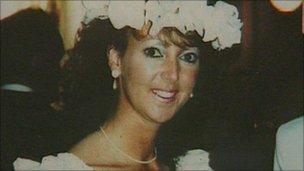Convicted killer Eddie Gilfoyle fights to clear name
- Published
Convicted murderer Eddie Gilfoyle has once again declared his innocence and pledged to fight to clear his name after a meeting at the House of Lords.
He was freed on licence in December after serving 18 years of a life sentence for the murder of his wife Paula in Wirral, Merseyside, in 1992.
Gilfoyle was barred from speaking about the case - but the order was lifted after lawyers argued it was unlawful.
He said he would not rest until he had cleared his name.
Gilfoyle, 49, spoke angrily to assembled members of the media following a meeting with his former MP Lord Hunt of Wirral, who organised the event.
Killing denial
He said: "I didn't kill my wife and I didn't kill my baby.
"I was released from prison in December. When I was released from prison I was told in no uncertain terms neither myself, my sister, my legal team, or anyone associated with me could talk to the media.
"If we had have, I was straight back to prison. Kenneth Clarke, the justice minister, authorised it. The reason he authorised it is because he didn't want me coming out and telling the truth."

Paula Gilfoyle was found hanged in Upton in 1992
Lord Hunt, a Conservative peer, challenged the restrictions with the Ministry of Justice (MoJ) and Parole Board chairman Sir David Latham.
The gagging order was lifted in January.
"I did not kill my wife and baby. They've known the truth for 18 years. I have been in prison for something I did not do, they knew I did not do it," Gilfoyle said.
A spokesman for the Ministry of Justice said: "This is not true - the secretary of state cannot authorise licence conditions in respect of life sentence prisoners.
"It is for the independent Parole Board to agree any licence conditions of lifers released from prison and for the courts to decide if an individual is guilty of a crime."
Pregnant wife
Paula Gilfoyle, who was pregnant at the time, was found hanged at the couple's home in Upton in 1992.
Prosecutors claimed her husband had fooled the 32-year-old into writing a suicide note before tying a noose around her neck and killing her.
Gilfoyle has had two appeals against his conviction rejected but has lodged a third bid with the Criminal Cases Review Commission (CCRC).
Gilfoyle's solicitor, Matt Foot, said there had been no forensic evidence for murder because "it was a suicide".
In the original case, prosecutors argued that Mrs Gilfoyle would not have been able to keep her balance as she walked up the ladder where she hanged, and would have been unable to get the rope over the beam.
But Mr Foot claimed these were "fallacies", adding: "These were complete and utter myths that were created by the prosecution and went into the trial."
The Crown Prosecution Service (CPS) said it could not comment while the evidence was being re-assessed by the CCRC.
- Published20 January 2011
- Published19 January 2011
- Published23 December 2010
- Published13 August 2010